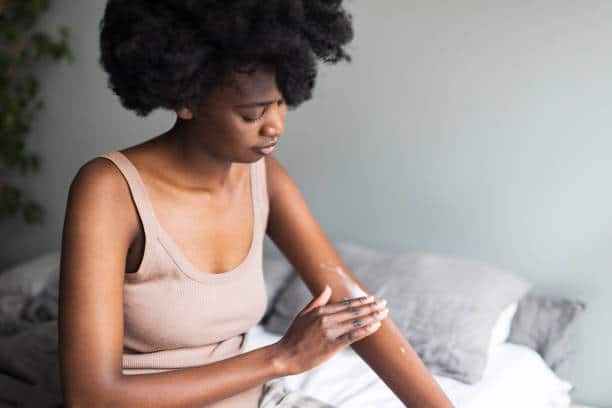
Eczema in dark skin is just different.
An inflammatory condition, eczema is known for its annoying scratchy symptoms and unsightly scars, scabs, and scales. Whether you’re nursing dry skin or dealing with ugly blisters, eczema isn’t fun. In Black folks, the normally red colors may present as brown or purple, often accompanied by discoloration, small bumps, and even dark circles near the eyes.
But here’s the good news!
If you wanna preserve that beautiful ebony skin without all the stress and hassle, you can. Whether it’s managing irritating shampoos, soaps, and detergents, or airborne allergens like dust and pollen, it’s time to regain control of your eczema.
Here are seven things you should avoid to keep your symptoms in check and your flare-ups on the down-low.
1. High-Pollution Days
You may have heard the term “Code Red,” which is often used to refer to poor air quality. If your local weather channel is telling you the pollution levels are high, stay indoors.
While pollution is bad for breathing, it can also be bad for your skin. Urban smog, wildfire smoke, and dry, hot conditions can all worsen your eczema. Be mindful and try to stay indoors when possible, using a HEPA filter to take any nasty particulates out of your air. If you need to be outside, don’t forget your lotion!
2. Scalding Hot Showers
Sometimes, all you wanna do is hop in a hot shower and let the weight off your shoulders. But did you know that all that hot water can lead to a complete hot mess of your eczema symptoms?
While warm showers and baths are good when taken in moderation (~10 minutes), too much heat can dry out the skin and cause itching. Darker skin is especially sensitive to this, making long, hot showers a no-no for Black eczema sufferers.
RELATED: 7 Facts About Eczema & Brown Skin You Wish You Knew Sooner!
3. Excess Stress
Of course, we’d all love to skip through life without a care in the world, with everything handled and dandy, but that’s never the case. And it doesn’t have to be.
Just a little bit of decompression – whether through a chat with friends, yoga, or relaxing on the couch – can do wonders for your eczema symptoms. After all, eczema is an inflammatory condition. When we stress, our bodies release the hormone cortisol, which can lead to inflammation over time. So, don’t worry – be happy!
4. Skipping on Supplements
Eating properly is important, but sometimes you need a lil’ somethin’ extra to get that needed boost. When it comes to dark skin, vitamin C is great for issues with scarring, discoloration, and spotty patches.
Meanwhile, vitamins D & E are also wonderful for eczema. Low levels of vitamin D (i.e., sunlight) have been associated with eczema, while the anti-inflammatory properties in vitamin E can soothe problem skin areas. Whether you use vitamin E oil or take vitamins C and D in capsule form, the benefits are backed by science!
RELATED: 10 Oils That Can Treat Your Eczema Naturally
5. Too Much Gluten
Although the science on gluten and eczema is far from settled, there are definitely connections. Some research indicates that gluten, a protein in cereal grains like wheat, can trigger eczema.
For people with certain autoimmune diseases, gluten can bring on eczema issues. If gluten gives you flare-ups, consider gluten-free grains or eat foods that don’t have gluten, such as fruits, nuts, beans, eggs, and lean meats.
6. Volatile Organic Compounds
Known as VOCs, these compounds are gasses that enter the air from certain products or chemical processes and trigger flare-ups. Examples include paints, disinfectants, air fresheners, office supplies, cleaners, and many other household products.
While it’s impossible to avoid these entirely, your best bet is to keep your space well-ventilated and store these chemicals in sealed areas away from livable spaces. And always, remember to dispose of them properly when done.
7. Certain Fabrics
The best thing for eczema is clothes that breathe. These generally include cotton and silk. Materials like nylon and polyester, meanwhile, often lead to sweating which, in turn, leads to skin irritation and flare-ups. Wool as well can be abrasive, rubbing your skin in the wrong way. Whatever you choose to wear, be sure to wash and dry your clothes thoroughly. This will get out chemicals and ensure your clothes feel soft and comfy.
By avoiding these seven simple issues, you’ll be surprised how much your eczema can improve. Make a note to do it daily, even leaving yourself reminders on the fridge or mirror if need be. In time, you might just be looking at a whole new you!









